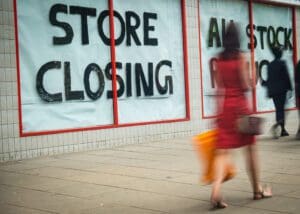A record number of shops are expected to close their doors this year, with rising business rates cited as the final blow for many retailers.
According to fresh figures from the Centre for Retail Research, store closures could hit 17,349 in 2025, surpassing the 17,145 recorded in 2022 when pandemic support measures were scaled back.
Last year saw 13,479 shops cease trading — a 28 per cent jump on 2023 — with well-known names among the casualties. Carpetright, once operating 273 stores, went under, although rival Tapi Carpets & Floors took on 54 of its sites. The Body Shop went into administration in February, closing 82 high street outlets, while Homebase’s demise in November shuttered half of its 130 branches, the other half saved by the owners of The Range.
On average, 37 shops closed every day in 2024, creating what the Centre for Retail Research called “another brutal year for the retail sector”. Many executives fear that 2025 will be even tougher due to an imminent rise in business rates, which takes effect in April.
Chancellor Rachel Reeves has announced a reduction in business rates relief from 75 per cent to 40 per cent for retailers, leisure firms and hospitality operators. According to Altus Group, this will see the typical shop’s rates bill more than double, jumping from £3,589 to £8,613 in the next tax year.
Alex Probyn, president of property tax at Altus, warns that slashing support “after a tough year for many retailers, especially independents, is foolhardy” and highlights the increase as contrary to Labour’s manifesto pledge to reduce the overall rates burden.
Smaller businesses continue to bear the brunt of the crisis, accounting for eight in ten of last year’s closures. The Centre for Retail Research anticipates that 14,660 of the projected 17,349 closures in 2025 will come from independents.
It is not all bad news, however. The Co-op intends to buck the downward trend by opening 75 new convenience stores in 2025. Yet the most recent figures from Sensormatic suggest that footfall in British shops fell by 11.4 per cent in the final full week before Christmas, compared with the same period in 2023. Diane Wehrle, founder of retail analytics group Rendle Intelligence, attributes the sluggish festive footfall to consumers’ “lack of confidence around the economy” and stormy weather deterring people from venturing out.
Read more:
High Street closures set to surge in 2025 as business rates burden grows
















